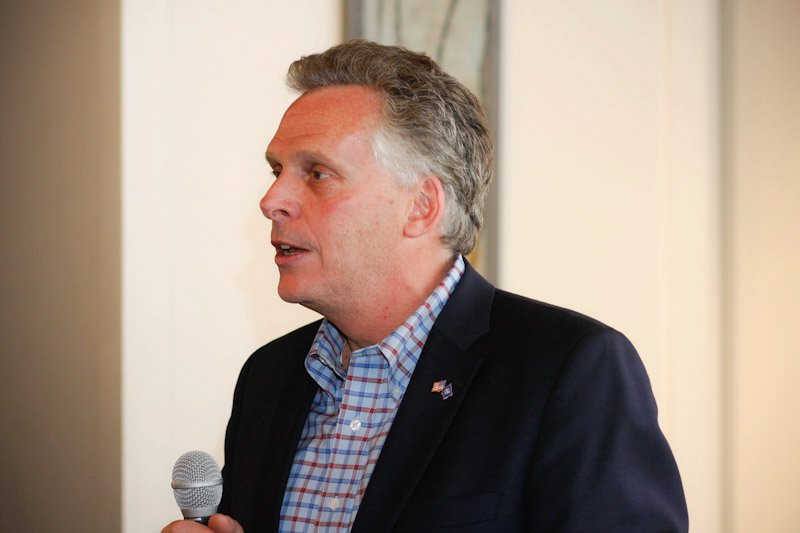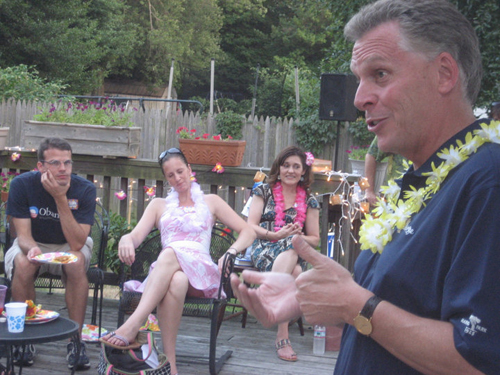
Losing a political primary can be morale-breaking. But for Terry McAuliffe, it was inspiring.
"I literally woke up the next day rarin' to go. I loved running, I loved talking to people and I'm doing what I said I'd do for the state, I'm just not doing it as governor," McAuliffe told me laughing.
Although the question of whether he will run again in Virginia in 2013 remains tantalizingly unanswered, there's little doubt McAuliffe will be a better potential governor now than two years ago.
The political maverick, famous for his prowess as a formidable negotiator, had a 135-page business plan for Virginia when he ran in 2009. But in the past two years he has brought his plan to life, doing what most successful candidates don't do -- fulfilling his campaign promises.

The former Democratic National Committee chairman and father of five has gone on a green crusade to bring renewable energy jobs and industrial dynamism to his home state. The Commonwealth of Virginia is today at a cross-roads between old and new, between colonial conventional and diverse cosmopolitan, and it shares in the suffering that all states now experience, lack of jobs.
"One-third of Americans have already been forced to change their lifestyle because their disposable income is gone. A guy can't go to the corner bar after a rough day at work to have a beer, that's gone to oil! We're borrowing from China, slapping an interest rate on it and shipping it to the Middle East -- that's not a good position for the United States of America."
According to the latest report from the Commonwealth Institute Fiscal Analysis based in Richmond, it may take ten years to reach pre-recession employment levels and in parts of Southwest Virginia unemployment is hovering near twenty percent. What worries McAuliffe most is that much of the state is propped up through generous Department of Defense spending, which is poised to be reduced soon under the Obama administration's extensive defense budget cuts. McAuliffe believes Virginia can be both fiscally responsible and economically productive with a little creativity.
By starting an electric and hybrid car company called GreenTech Auto, investing in wind turbines, scouting out new technology throughout Asia to bring back home, and fighting to resuscitate a shuttered factory in Franklin, Virginia, McAuliffe is personally taking the strategic financial risks he believes the state needs to launch into the future.
In fact, with its diverse population (Fairfax County public schools boast 192 different nationalities), its geographic location abutting against the nation's capital, with major research universities (both public and private), and world class international airports and sea ports, the state has no excuse in McAuliffe's eyes than to be doing better than it is.
"Virginia is where Dorothy and I decided to raise a family twenty years ago. I love it. I love this tax base, I love this education system, and I love its great pro-business mentality and incredible natural resources. Moving here was the best decision we ever made. But now Virginia needs to shake things up and get into the global game."
The fact that McAuliffe has mastered the Gordian nuances of global business is a major asset, according to several Virginians I spoke to while shadowing him. On the day of his youngest son's First Communion, we spent four hours at two separate events for Northern Virginia Democrats, where McAuliffe served as a keynote speaker for both. Worrying that his wife would "kill him" if he was late, McAuliffe later zipped home in his hybrid Chevy to make the late afternoon service.
"I have big ideas. If you don't like them, don't vote for me. And you didn't."

McAuliffe joked about his 2009 effort as he introduced Del. Scott Surovell at a Mexican-themed barbecue, replete with a bright-colored Piñata and lively mariachi band. Although some voters remain puzzled by this high-energy force of nature, they're also drawn to his enthusiasm and curious about his business ventures. Sitting in a circle around a fresh keg, blue Solo cup in hand, McAuliffe seemed like a tempered version of the braggadocio who once wrestled an alligator for a $15,000 political contribution.
Arriving at his GreenTech Auto Corporation corporate headquarters two days earlier, I was intimidated to meet the much-televised McAuliffe. But I found the man that greeted me to be open and keenly reflective on how he can contribute to a country that has allowed him to start 25 successful businesses from scratch. Below is a condensed version of our two-hour conversation.
Natalia Brzezinski: Why are you so passionate about renewable energy?
Terry McAuliffe: I've always been an entrepreneur, but it's never been about the money. I like a challenge, the harder the better. But you know what, I'm in my early 50s and at a stage of my life where it's not even about that anymore, it's about what I can do to give back, to make the place a little bit better for the next generation.
Ultimately, it's about the environment, job creation and national security. We import nearly 60 percent of our oil from overseas, much of it from countries that don't like us. In addition to the $900 billion we spend on petroleum products per year, we spend $65-85 billion dollars a year to protect the channels where that oil is flowing. That money should be going to the American people.
How quickly do you think America is slipping behind in renewable energy?
China recently announced an $800 billion dollar investment in alternative energy -- $800 billion! According to Pew, America used to be number one in investment in alternative energy, now China has taken the lead and Germany is second. Last year, private investment for green initiatives in China reached 54.4 billion dollars. Boy, I think some of that ought to come here to America.
Do you think business is much better poised than government to usher in a green revolution and create jobs?
No question. As a private entrepreneur I'm willing to take some big risks and I'm proud to say I've done what very few other businessmen have done. I've gone to China, bought a manufacturing company and moved it to America. Now China wants to buy back some of that new technology from me. That's a great story for America.
What's the key to revving up job creation?
We've got to get into the jobs of the 21st century. I think alternative energy is one of the greatest ways to do it. Many of these jobs are skilled manufacturing jobs, the sector which has been hit hardest. You don't go to those people and tell them, 'now we're going to re-train you to work with computers'. They want to work with their hands. That's what they love to do! We could save entire communities by bringing just one electric car manufacturing plant to a town.
I'm making definite progress in taking over part of the massive International Paper plant in Franklin, VA that decimated the community when it was shuttered. We're going to make wood pellets and ship them to Europe where they will be mixed with coal. Europe currently imports ten million tons of wood pellets per year and now plans to increase that to 100 million tons. So this could be a new, lucrative industry for the region and create thousands of new jobs.
What else do we need to do as a nation to become competitive?
You need to incentivize. In parts of Europe you don't pay any parking meters or any tolls if you have an electric car. In Denmark, they have 150 percent excise tax on new cars but electric are exempt. We also need a national energy standard to compete against other nations. And Virginia is the only state in the Mid-Atlantic without a renewable energy standard. I say all the time we've got to fix that.
High speed rail is also something I always talk about. You build the cars here, you build the rails and tracks here, and it'd be a huge job creator. China is now the leader in high speed rail but this is a market America should own!
Is Virginia ready to compete on the global level?
With the right leadership it would be. This is not a partisan thing, but we're not offering any incentives compared to our neighbors.
I decided to locate our first GreenTech Auto manufacturing plant in Mississippi because their governor was very aggressive and state and county officials offered us an incentives package worth millions. I wanted to do it in Virginia, my home, and where our corporate headquarters is located, but I have a fiduciary responsibility to my shareholders to go where the company will be most successful. Virginia didn't bid on it. But hopefully in the next 6-7 months we will be announcing our next plant which will hire thousands of people. I'm hopeful that Virginia will have an interest in it.
How do you respond to anxious workers in coal states who worry that renewable energy is going to take away their livelihoods?
I spent five hours in a coal mine a few months ago. I wanted to have a better understanding of their work. I would never look those people in the eye and take away their jobs. We're always going to need coal energy. But we do need to re-work our grid and diversify to create more jobs and remain competitive.
If I asked your children about you, what would they tell me?
Hopefully they'd say they love me and I'm a lot of fun. They'd probably also say I drive 'em crazy! I started my first business at 14-years-old. Now they're in that age range and I'm constantly asking them 'why aren't you guys starting your own businesses?' They run from me.
